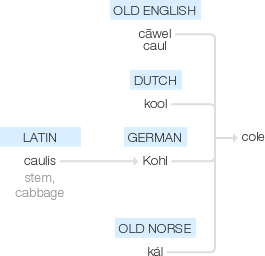Cole
Old English cāwel, caul, related to Dutch kool and German Kohl, from Latin caulis ‘stem, cabbage’; reinforced in Middle English by forms from Old Norse kál . Compare with kale.
wiktionary
Wikispecies From Middle English cole, col, from Old English cawel, from Germanic, from Latin caulis(“cabbage”). Cognate with Dutch kool, German Kohl. Doublet of kale.
(This etymology is missing or incomplete. Please add to it, or discuss it at the Etymology scriptorium.)
etymonline
cole (n.1)
"cabbage," a dialectal survival of Middle English col, from late Old English cawel, or perhaps from or influenced by cognate Old Norse kal. Both words are from Latin caulis "stem, stalk" (which in Vulgar Latin replaced brassica as the usual word for "cabbage"), from Proto-Italic *kauli- "stalk," from PIE root *(s)kehuli- "stem of a plant, stalk" (source also of Old Irish cual "faggot, bundle of sticks," Greek kaulos "stem, stalk, pole," Armenian c'awl "stalk, straw," Old Prussian kaulan, Lithuanian káulas "bone").
Latin caulis "cabbage" is the source also of Italian cavolo, Spanish col, Old French chol, French chou; it also was borrowed elsewhere in Germanic, for example Swedish kål, Danish kaal, German Kohl, Dutch kool.
cole (n.2)
"trickery deceit," an obsolete 16c. word "of unknown etymology, and even of uncertain existence" [OED], inferred from words in several texts dating to c. 1300, "some of which might possibly be explained otherwise." These include notably cole-pixy "mischievous fairy" (1540s), a southwestern England dialect word (later colt-pixie) and cole-prophet "pretended mystical fortune-teller."
